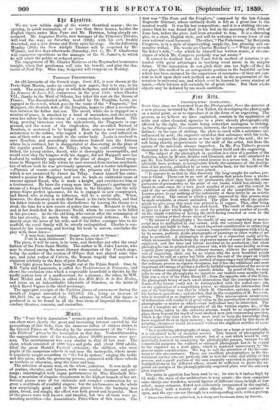3Eusir.
The "Tonic Sol-fa Association" seems to grow and flourish. Nothing can show more clearly the great and increasing interest excited by the proceedings of this body, than the immense influx of visitors drawn to the Crystal Palace on Wednesday by the announcement of the "Juve- nile Festival" given by the Association on that day. Nothwithstanding the unpropitious state of the weather, above 20,000 persons were pre- sent. The entertainment was very similar to that of last year. The choir, which consisted of 4000 boys and girls, and about 1000 adults, filled the great Handel Festival orchestra; the children, who were pupils of the numerous schools in and near the metropolis where music is popularly taught according to "the Sol-fa system," singing the treble and alto parts, while the grown-up persons, connected with those schools as teachers or otherwise, sang the tenor and bass. The selection of music was, on the whole, judicious. It was made up of psalms, chorales, and hymns, with some secular choruses and part- songs; intermingled with organ performances by Miss Elizabeth Stir- ling, a musician of singular attainments in the highest branch of her art. Several pieces were of too elaborate and complex construction for so great a multitude of youthful singers ; but the performance on the whole was surprisingly good; and in those pieces where the harmony was plain, broad, and simple, the effect was both grand and beautiful. Most of the pieces were well known and familiar, but two of them were in- teresting novelties—the Association's Prize-Glees of this season. The first was "The Fern and the Foxglove," composed by the late Johann Ruprecht Diirnier, whose untimely death is felt as a great loss to the musical world. It was his last composition; and it is a striking circum- stance that he was found dead in his bed on the morning of the 10th of June last, before the prize had been awarded to him. It is a charming glee, in a clear, English style, and will be welcome to every lover of our own national vocal harmony. The other, "The Fisherman," by Benjamin Congreve, is in a style of unpretending simplicity, but pleasing and ex- pressive withal. The words are Charles Mackay's :—" What joy attends the fisher's wife,",—for which he himself has written music, a circum- stance of which Mr. Congreve probably was not aware.• It cannot be doubted that the Tonic Sol-fa method of notation is at- tended with great advantages in teaching vocal music in its simpler forms. If the Association do not pitch their aim too high—if they do not place this method in an antagonistic position to the beautiful system which has been matured by the experience of centuries—if they are con- tent to look upon their own method as an aid in the acquirement of the notation in universal use, and which must be learned by every student of music,—their labours will certainly be of great value. But their whole objects may be defeated by too much ambition.


























 Previous page
Previous page